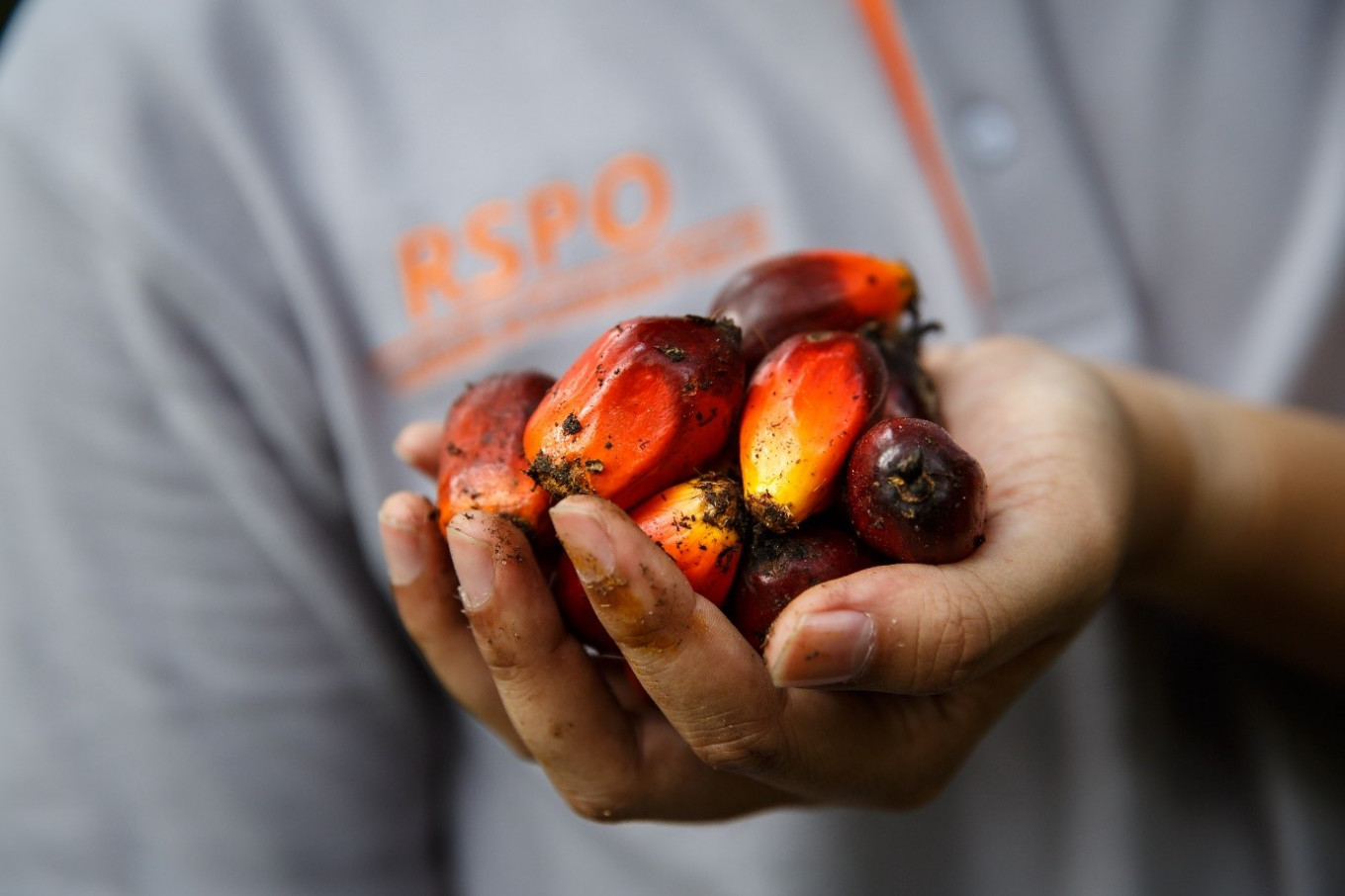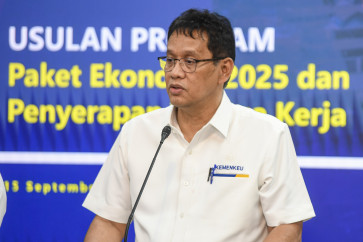Popular Reads
Top Results
Can't find what you're looking for?
View all search resultsPopular Reads
Top Results
Can't find what you're looking for?
View all search resultsEncouraging Indonesian consumers to choose ‘good’ palm oil
For this reason, in 2019 the Roundtable on Sustainable Palm Oil (RSPO) set Shared Responsibility rules aimed at encouraging its members to adopt shared sustainability requirements and obligations.
Change text size
Gift Premium Articles
to Anyone
W
ith the increasing demand for palm oil in Indonesia, palm oil buyers must step up their sustainability commitments and help generate demand for ‘good’ palm oil.
For this reason, in 2019 the Roundtable on Sustainable Palm Oil (RSPO) set Shared Responsibility rules aimed at encouraging its members to adopt shared sustainability requirements and obligations. The Shared Responsibility rules have been introduced to ensure that all available certified sustainable palm oil (CSPO) produced by RSPO grower members is met with equal demand from users and consumers.
The palm oil sector is a diverse industry, with upstream and downstream businesses involving many stakeholders, from growers and buyers to investors and other partners - each must do their part to make sustainable palm oil the norm.
RSPO Indonesia Outreach and Engagement Manager, Margareth Naulie Panggabean said that as part of their membership, RSPO members have long been committed to the spirit of Shared Responsibility, “where the RSPO, as a system, is a facilitator of a solution; not a fixer,” she said in an interview.
Although Shared Responsibility targets vary from one member category to the next, “they all align with fulfilling the RSPO’s mission of making sustainable palm oil the norm,” she noted.
Margareth explained further that following updates in 2021, RSPO retailer and consumer goods manufacturer members were required to increase their uptake of CSPO by an additional 12 percent from the previous year’s baseline for the first year of Shared Responsibility implementation.
For RSPO members under the processor and trader category, a 2 percent uptake target is required for the first year of Shared Responsibility implementation.
The other membership sectors, such as financial institutions, social and environmental NGOs, also need to comply with the Shared Responsibility concept in accordance with their respective roles in transforming the market.
The RSPO has seen impressive growth in sustainable palm oil production from its members over the past 14 years. However, she said, the demand has not kept pace with supply, and “there were misconceptions that buyers do not need to adhere to the same standards applicable to producers because there were no set rules in place for this.”
Now with the Shared Responsibility requirements, the RSPO can encourage greater uptake of CSPO by stakeholders across the entire sustainable palm oil supply chain, she said.
But encouraging responsibility among all palm oil stakeholders is challenging. In particular, she revealed, it is difficult to create a virtuous circle within the sustainable palm oil supply chain where actors positively influence each other to achieve better outcomes for people and the planet.
“While growers can adopt sustainable practices, we need downstream players to implement sustainable sourcing policies and purchase CSPO in increasing volumes so as to incentivise the production of greater quantities of CSPO,” she said.“ We have yet to see strong demand from Indonesian consumers and without this pressure, downstream actors may be less motivated to switch from conventional palm oil to CSPO, produced by RSPO grower members,” she said.
RSPO Trademark
How is “good” palm oil defined when linked to sustainability?
RSPO Indonesia Senior Executive, Outreach and Engagement, Winda Adelita Saragih stated that when grown unsustainably, oil palm agriculture can cause many environmental problems, from the destruction of habitats of endangered species to deforestation to air, water and soil pollution.
She went on to say, “When grown sustainably, however - meaning in line with the RSPO certification standards - oil palm agriculture and the environment can coexist in harmony, primary and secondary forests are protected, and wildlife habitats are not harmed.”
“Until such time as sustainable palm oil becomes ‘the norm’, it is important for consumers to differentiate between ‘good’ and ‘bad’ palm oil,” she explained.
Labelling products that contain CSPO and using the RSPO Trademark on products are simple ways for brands to show shoppers their products are sustainable, she pointed out.
Ensuring that consumers are able to identify and choose products that contain CSPO will also help to increase demand for products that have been produced and sourced in a sustainable manner, according to Winda.
Explaining why consumers are encouraged to consume “good” palm oil, she said that billions of people consume palm oil every day, with the largest markets being India, China and Indonesia. These markets therefore have huge potential to make sustainable palm oil the norm.
Demand for palm oil in Indonesia has been steadily rising in tandem with growing affluence. “At the same time, this poses grave environmental and social challenges unless we can ensure that producers adopt sustainable practices,” she said.
Some organisations and consumers believe the way forward is to boycott palm oil, but that is neither realistic nor sustainable. A boycott means that companies will turn to alternative oils that require more land and potentially cause more damage to the environment.
“As it currently stands, oil palms produce roughly 35 percent of the world’s vegetable oil on less than 10 percent of the land allocated to oil crops. Moreover, palm oil is an important crop for Indonesia’s gross domestic product [GDP] and millions of smallholder farmers depend on oil palm cultivation for their livelihoods,” she said.
According to her, one of the best solutions is to encourage consumers to buy products that contain sustainable palm oil and demonstrate to growers that there is a thriving market for their produce.
Data at the RSPO show that as of the year-to-date (January - August 2021), Indonesia produced 11.28 million tons of CSPO, or around 60.6 percent of the total production of certified palm oil globally, from the 229 RSPO certified mills and its supply bases, excluding the independent mills and independent growers.
Out of the figure, 2.17 million tons, approximately 47.47 percent of the total transaction of certified volume in the global market, had been shipped out to the buyer as RSPO certified sustainable products. This puts Indonesia in the top ranking for RSPO-certified producers and sellers.
Comparing the above production and sales of CSPO volume in Indonesia, the market absorption rate of CSPO from Indonesia stands at 19.2 percent.
Looking ahead, the RSPO will be organising programmes to drive consumer awareness of sustainable palm oil and the importance of purchasing products containing CSPO.
“The goal is to help increase the demand for sustainable palm oil products so that more supply chain actors see the feasibility and viability of producing products using CSPO and the RSPO Trademark in Indonesia,” Margareth asserted.
Some activities include appointing RSPO ambassadors and/or youth influencers and strategic partners to promote the positive impact of sustainable palm oil.
This involves educating young consumers about their role in achieving a sustainable palm oil market and voicing the demand for their favourite brands to use CSPO.
The RSPO will work with members, stakeholders, other certification schemes and Indonesian youth to help educate consumers with engaging content on the importance of sustainable palm oil production.










